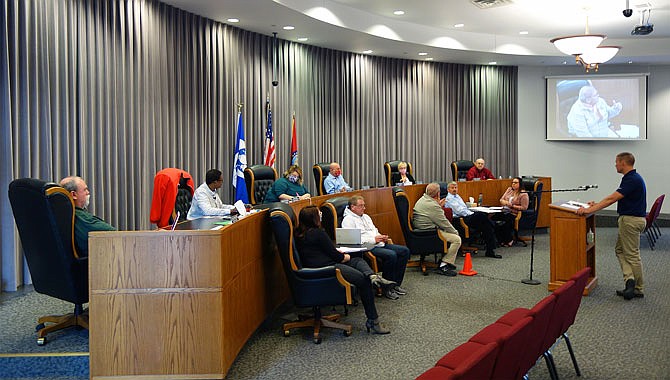Following a weeks-long pause and a minor outcry, Fulton's residential recycling program is resuming this week.
Fulton City Council members voted Tuesday to resume the program, under which city residents can pay $1 a month for a recycling bin or simply set out recycling on trash day to be picked up for free. The city suspended residential recycling when the pandemic hit.
"It's something people have reached out about and want back," said Lindsey Pace-Snook, Ward 3 council member.
Fulton Director of Administration Bill Johnson said the program comes with a pretty hefty price tag for the city.
"It's very expensive, and we're losing serious money on it," he said. "It costs us $140 per ton to recycle, versus $40 per ton to discard it in the landfill."
City residents generate about 16 tons of recycling per month; in total, disposal alone costs the city around $27,000 per year. The city also has to maintain a separate truck for recycling and pay fuel and staff for the extra trip, Johnson said.
"It was a great deal a few years ago when the recycling market was better," he added. "But right now, there's very little market for anything."
City Council members said the program is popular among residents. Pace-Snook wasn't the only council member getting phone calls about its suspension.
"There's still a cost to the city if we throw it in a landfill," Ward 2's Jeff Stone pointed out.
Ward 4's Rick Shiverdecker acknowledged the cost to the city.
"Once we get going, we could explore some other avenues about how we're going to pay for this," he said. "Maybe we could start implementing fees or other ways to reduce recycling. But to take it away entirely when we've been doing it free for so long, that's not the right way to do it."
John Braun, Ward 3, said his constituents have expressed willingness to pay extra for the service. The program is worth continuing, he said.
"We have one world to live in and this is it - let's try to do our best," he said.
Following Johnson's reassurance the program could be resumed within a few days, council members voted to do so.
"It's what the community wants," Stone said.
Rec center
Council members also reviewed several loan options to fund the new recreation center under construction in Veterans Park.
The facility is estimated to cost around $8.89 million to complete. It is to include basketball and volleyball courts, a fitness center, a turf fieldhouse, classrooms and more. Fulton funded just under $4 million of the total cost in its 2020 budget but is seeking a $5 million, 15-year loan to fund the rest.
The city hopes to repay the loan with facility revenue and the half-cent sales tax passed in 2016 for the purpose of paying for parks and recreation projects. That tax brought in about $412,500 in 2019, according to the budget.
Fulton Chief Financial Officer Kathy Holschlag presented three loan options:
- Option one: A lease-purchase agreement with local banks, with the interest rate locked at 3.1 percent for the first 10 years then refinanced for the last five-year period. The city would have to pay at least $1.26 million in interest (in addition to the principal) over the 15-year term, and possibly more if the loan is refinanced at a higher interest rate.
- Option two: A bank loan arranged through Stifel at 3.03 percent for 15 years, plus an up-front cost of $46,500 for brokerage, band and trustee fees. The city would have to pay $1.23 million in interest over 15 years.
- Option three: A bank loan arranged through Stifel at 2.75 percent for 15 years, plus an up-front cost of $46,500 for brokerage, band and trustee fees. This arrangement would require the city to pledge Fulton City Hall as collateral while the rec center is under construction; once completed, the rec center would serve as collateral. The city would have to pay $1.11 million in interest over 15 years.
"The difference between option one and option three is only $150,000 over the 15-year life of the loan," Holschlag said.
Ward 1's Ballard Simmons pointed out that option one wouldn't require to come up with $46,500 up front "when we're going to be strapped for cash." Stone also favored that option because it would give the city a chance to work with a local bank.
On the other hand, Mayor Lowe Cannell pointed out, refinancing the loan adds an element of unpredictability.
"Right now, we're at historic low interest rates, and for us to stay that low is unlikely," he said.
The city would negotiate with the lender before finalizing the loan to put a cap on the interest rate, Holshlag said.
With the lowest interest rate, option three might be cheapest for the city - but if the city defaulted on the loan, it could lose Fulton City Hall or the new recreation center.
"We've never been asked to put up collateral during the construction period," Holschlag said.
Council members asked Holschlag to work on negotiating the interest cap for option one and return with more information at the next meeting.
"We don't need this loan in place tomorrow," Cannell said.

